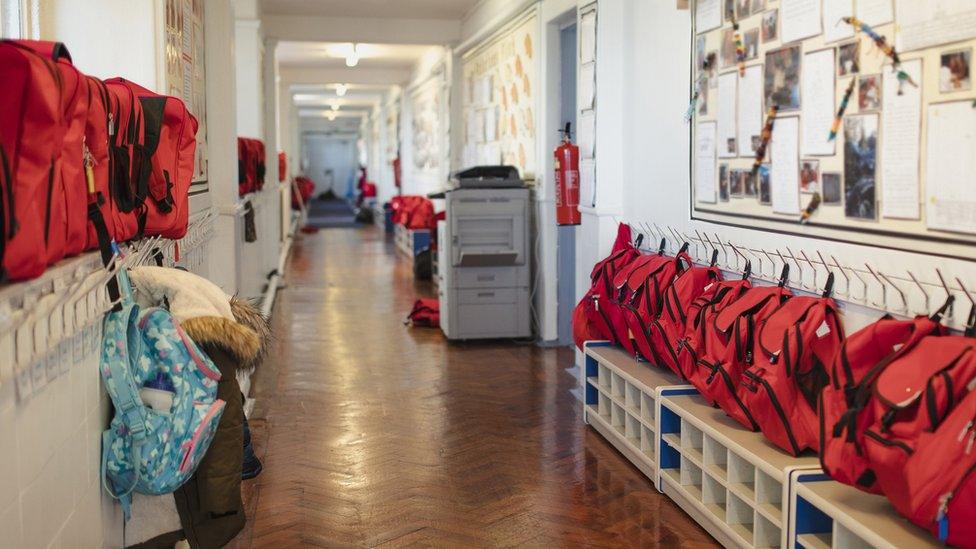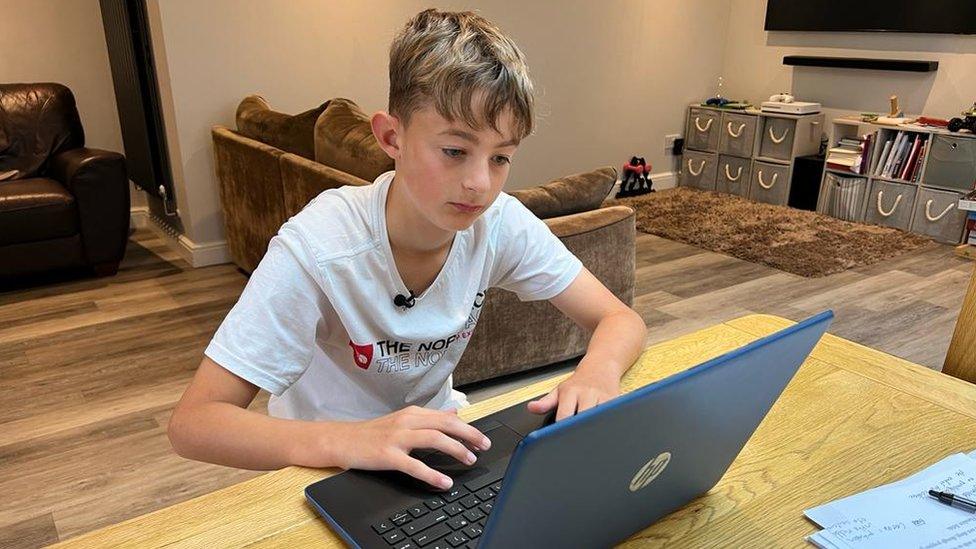Raac: Keegan says some pupils prefer temporary classrooms
- Published
- comments

Downing Street has defended Education Secretary Gillian Keegan after she said some pupils in schools with crumbling concrete preferred temporary classrooms.
Rishi Sunak's spokesman said she was "reflecting a conversation" with children, and had his full confidence.
New figures show 174 schools in England have reinforced autoclaved aerated concrete (Raac).
Temporary classrooms are among the safety measures in place.
Responding to an urgent question in the House of Commons earlier, Ms Keegan said: "I have been to a number of these schools, and in fact at the first school I went to the children were all petitioning me to stay in the portacabin because they actually preferred it to the classroom."
Asked why Mr Sunak still had confidence in Ms Keegan, his spokesman said: "The department that she is leading has worked hard in recent weeks... to make sure that, for the vast, vast majority of children their education is unaffected by this challenge."
Labour's shadow education secretary Bridget Phillipson, meanwhile, said the Raac crisis had been a "colossal shambles".
Officials have been checking hundreds of schools every week.
The number of schools in England affected by crumbling concrete stood at 147 on 30 August, but has increased by 27 as of 14 September.
The government said it would be updating its list, external every two weeks.
Earlier, education minister Baroness Barran and the Department for Education's permanent secretary, Susan Acland-Hood, told the education select committee:
29 schools required temporary classrooms, of which 11 already had them in place
As of Friday, orders had been made for 180 single and 68 double classrooms, plus a mix of "hygiene facilities" (toilets)
But they were unable to provide figures for the number of classrooms that have already been delivered.
Despite the increase in cases of confirmed Raac in Tuesday's updated list, more pupils in affected schools have been able to return to full-time face-to-face education since the first list was released.
Your device may not support this visualisation
Note all settings with confirmed Raac at 14 September 2023 as published, external on the government website on 19 September.
A number of schools had to delay their September term restart as the DfE told them to close areas where Raac was present.
Only one setting still has pupils in full remote learning, down from four two weeks ago. Twenty-three settings are providing a mix of face-to-face and remote arrangements, up from 20 on 30 August.
There are no schools that remain closed following the summer holidays. In the first set of figures, there were 19 either closed or delaying the start of term due to Raac.
Three post-16 education settings have also been added to the list of sites affected by crumbling concrete.
The figures released by the DfE relate to state-funded educational settings and mostly include schools as well as maintained colleges and nurseries.
Raac is a lightweight material that was used mostly in flat roofing, but also in floors and walls, between the 1950s and 1990s. It is a cheaper alternative to standard concrete and has a lifespan of about 30 years.
Officials have been aware of issues with Raac for decades. But in June this year, a report by the National Audit Office said years of insufficient funding had increased the risk of a building collapse.
Over the summer, a Raac panel that would have been classed as "non-critical" collapsed at a school in England - leading to the final decision to take action. You can find a full timeline of how the concrete crisis developed here.
Paul Whiteman, general secretary of the National Association of Head Teachers (NAHT) union, said the new list of affected schools was an "important update", but called for a "clear plan" to repair and replace damaged buildings over a longer period.
The Local Government Association, which represents councils, called on the government to tell local authorities which schools had not yet returned their questionnaires on Raac.

10 schools with Raac were turned down for re-building
By Daniel Wainwright, BBC Verify
The government has pledged to rebuild 50 schools in England per year.
Yet of the 174 schools in England now confirmed to have Raac, BBC analysis shows 10 were not selected for the school rebuilding programme, external in 2022, while 12 schools now known to be affected were chosen.
But the rebuilding programme is not the only pot of money that can be used to deal with crumbling concrete.
Among the schools whose rebuilds were not taken forward, seven have been awarded funding since 2015 from a separate scheme, external to deal with "significant condition needs", such as health and safety issues and buildings in poor condition.
Their bids to the Condition Improvement Fund include asking for money for "urgent Raac deck removal", "urgent Raac structure" and "urgent roofing replacements".
BBC Verify has also found 20 secondary schools with Raac on the latest list whose rebuilding and refurbishment projects under a former Labour programme - called Building Schools for the Future - were cancelled by the Conservative-led coalition government in 2010.
However, it is far from certain that Raac would have been dealt with had those refurbishments gone ahead.
We found a further six schools were unaffected by the cancellation of Building Schools for the Future back in 2010, yet have still turned up on the list of those with Raac.

Ms Phillipson asked Ms Keegan in the Commons earlier to explain why affected schools were told to close on 31 August, when she had received advice about Raac 10 days earlier, during which time Ms Keegan went abroad on holiday.
Ms Keegan said she had wanted to wait for "technical evidence" about Raac before deciding whether to tell head teachers to close schools.
In Scotland, schools in 16 local authorities have been found to contain Raac and surveys will be carried out at 120 schools across Northern Ireland to check for the concrete, the education authority has said.

Elliot, a year eight pupil at Myton School in Warwick, logs on for a day of remote learning on Tuesday morning
Fay Arrundale's son, Elliot, attends Myton School in Warwick, but the secondary school has had to close part of its site because of Raac, and is now having different year groups attend in alternate weeks.
Year-eight pupil Elliot logged on for his remote school day on Tuesday morning from his home, which is a short distance away from the school.
"It's quite annoying because it's only just there, so it is frustrating," he said.
"It's very different to being in school because it's a very different environment. [I miss] my friends, and I worry that if this goes on for too long I will be behind on my education.
"We won't learn much if we're just sat behind a screen."


How are you being impacted by the ongoing problems with Raac? Tell us your story by emailing us at: haveyoursay@bbc.co.uk, external.
Please include a contact number if you are willing to speak to a BBC journalist. You can also get in touch in the following ways:
WhatsApp: +44 7756 165803, external
Tweet: @BBC_HaveYourSay, external
Or fill out the form below
Please read our terms & conditions and privacy policy
If you are reading this page and can't see the form you will need to visit the mobile version of the BBC website to submit your question or comment or you can email us at HaveYourSay@bbc.co.uk, external. Please include your name, age and location with any submission.
